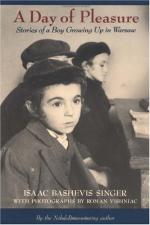|
This section contains 432 words (approx. 2 pages at 300 words per page) |

|
Life in the Warsaw ghetto of the early twentieth century could be rough, even brutal, and Singer does not gloss over the conditions he endured as a child. He graphically describes the lack of running water and bathroom facilities, the filth and vermin, the abject poverty and disease in stories such as "The Shot at Sarajevo" and "Hunger." Singer also depicts the cruelties human beings inflict upon one another, but they do not receive undue attention. Singer remembers that despite deplorable circumstances individual acts of kindness and charity, even from those least able to afford them, were not unusual. When the Singers find themselves in severe straits, a helping hand frequently appears to save them from ruin and despair. Finally forced to move from starving Warsaw to rural Bilgoray during World War I, Isaac recalls the shoemaker's hovel where he went to get his shoes repaired...
|
This section contains 432 words (approx. 2 pages at 300 words per page) |

|




